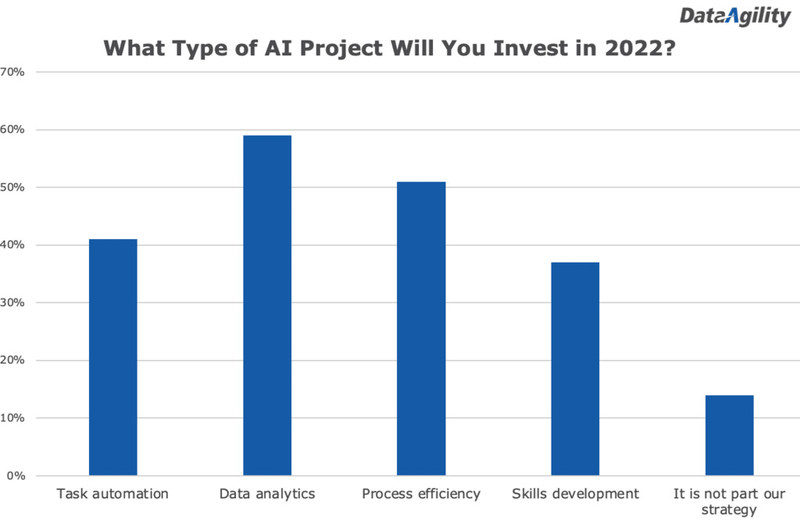Australian executives need to close the communication gap for AI strategies to succeed, a New Study by Data Agility and AIIA
MELBOURNE, Australia
– The study by Data Agility and the Australian Information Industry Association (AIIA), surveyed over 260 Australian leaders from various industries.
– 92% of C-suite and board members are aware of AI projects in their organisation, whereas only 66% of managers and senior roles are aware.
In 2021 the Department of Industry, Science, Energy and Resources shared Australia’s Artificial Intelligence (AI) Action Plan. The document contains the strategies to turn the country into “a global leader in developing and adopting trusted, secure and responsible AI.”
As this study finds out, there are numerous obstacles to overcome for organisational leadership to successfully implement AI projects. Highlights from the study are below, and the report link includes all 17 stats, insights and graphs.
To view the full study results click here: https://www.dataagility.com/report-are-australian-leaders-ready-for-the-impact-of-artificial-intelligence/
Highlight from the study:
– 7% of government sector leaders will invest in AI skills development, compared to 54% of professional, scientific and technical services leaders.
Without the investment in AI skills development, the public sector will lag behind the private sector. Government sector leaders should act now to develop and acquire the necessary skills.
– Only 18% of professional service industry leaders expect AI to improve org efficiency but 96% believe it will help their company grow.
This is a very interesting result indicating a unique perception within the professional service industry. Leaders in this industry expect business growth from AI, but do not expect the impact to be felt internally with process improvements. This implies professional service industry leaders believe AI will not affect them directly. However, they do believe AI will provide benefits to their organisation externally through growth.
– 90% of C-suite and board members expect AI to create new roles in their organisation, whereas only 66% of managers and senior roles expect so.
This highlights a lack of dissemination of information across organisations. It’s great the executive leadership teams know what they want but it’s not being communicated down the chain. As AI becomes more commonplace at the workplace, executive teams will need proactive communication on their AI strategies to ensure organisational alignment.
– Data analytics, driving quality insights, is the most desirable AI project to invest in 2022.
59% of leaders are focusing their investments on this type of project rather than cost and speed opportunities such as task automation and process efficiency.
– The most important driver for AI adoption in the health sector is “better customer service”, in comparison to all other industries choosing “better service delivery”.
The health sector is very patient, or “customer”, centric. This stat follows the natural path of health sector leadership, in comparison to the other sectors that focus more on the method, i.e. the service, over the end recipient.
Data Agility(https://www.dataagility.com/) is a specialist consulting company that delivers data quality, migration, integration, reporting, and the strategy that puts that all in place. It provides data analytics, information management, project delivery and managed services.
The Australian Information Industry Association (AIIA)(https://aiia.com.au/) is Australia’s peak representative body and advocacy group for those in the digital ecosystem.
Important Links
Full report(https://www.dataagility.com/report-are-australian-leaders-ready-for-the-impact-of-artificial-intelligence/)
Survey Methodology (https://www.dataagility.com/wp-content/uploads/2022/03/Data-Collection-Method.pdf)
SOURCE: Data Agility